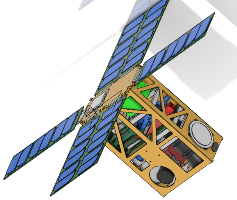| Spacecraft name | QlevEr-Sat (QlevEr Sat, QlevEr Sat) |
|---|---|
| Spacecraft type | CubeSat |
| Units or mass | 6U |
| Status | not launched, expected in 2027 |
| Launcher | not launched |
| Organisation | CSUG-IPAG (Univ. Grenoble Alpes) |
| Institution | University |
| Entity | Academic / Education |
| Headquarters | France |
| Manufacturer | AIVT by U-Space |
| Oneliner |
Artificial Intelligence (AI) Earth observation demonstration satellite designed to test AI routines on board and reduce ground data transmission. |
| Description |
Artificial Intelligence (AI) Earth observation demonstration satellite designed to test AI routines on board and drastically reduce ground data transmission. To illustrate the benefits that AI could bring in image analysis and data reduction, Barthelemy noted that a satellite taking one 16Mpixel image every second (coded in 12 bits), ground data transmission amounted to 16 Tbits/day (2.03 TB/day). With its ultra-light embedded AI model and versatile software architecture, the QlevEr-Sat could address multiple EO use cases and only downlink usefull information. With the Emerald CMOS imager selected for this project, the ultra small 2.8μm pixels provide a ground based resolution of 4.8m at 500km. For a 16Mpixels sensor, it means the satellite’s camera covers an 18 kilometers-wide swath of land below its orbital path. The Qormino module onboard the QlevEr-Sat will run machine learning algorithms developed by Grenoble’s Multidisciplinary Institute in Artificial intelligence (MIAI) and trained for different applications. Currently in its Preliminary Definition phase (Phase B) and seeking funds and partners for phases C/D, the QlevEr-Sat aims at surveying specific regions for deforestation (pilot use case), or it could monitor urban expansion, other human activities associated with societal challenges, or damages from natural disasters, or other changes on Earth. In addition to cloud detection, QlevEr-Sat's AI algorithm can easily be trained and retrained to detect all sorts of textures. |
| Notes | |
| Sources | [1] [2] [3] |
| Keywords | Machine Learning AI |
Last modified: 2026-01-03

